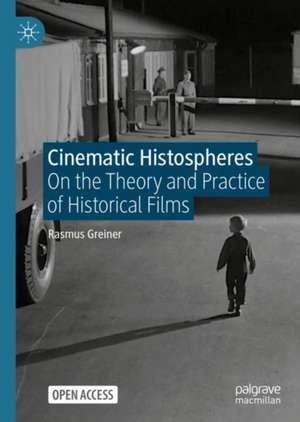Cinematic Histospheres: On the Theory and Practice of Historical Films
Autor Rasmus Greineren Limba Engleză Paperback – 20 mai 2021
| Toate formatele și edițiile | Preț | Express |
|---|---|---|
| Paperback (1) | 349.91 lei 6-8 săpt. | |
| Springer International Publishing – 20 mai 2021 | 349.91 lei 6-8 săpt. | |
| Hardback (1) | 420.97 lei 6-8 săpt. | |
| Springer International Publishing – 20 mai 2021 | 420.97 lei 6-8 săpt. |
Preț: 349.91 lei
Nou
Puncte Express: 525
Preț estimativ în valută:
66.96€ • 71.60$ • 55.83£
66.96€ • 71.60$ • 55.83£
Carte tipărită la comandă
Livrare economică 17 aprilie-01 mai
Preluare comenzi: 021 569.72.76
Specificații
ISBN-13: 9783030705923
ISBN-10: 3030705927
Pagini: 229
Ilustrații: XVI, 229 p. 37 illus., 16 illus. in color.
Dimensiuni: 148 x 210 mm
Greutate: 0.3 kg
Ediția:1st ed. 2021
Editura: Springer International Publishing
Colecția Palgrave Macmillan
Locul publicării:Cham, Switzerland
ISBN-10: 3030705927
Pagini: 229
Ilustrații: XVI, 229 p. 37 illus., 16 illus. in color.
Dimensiuni: 148 x 210 mm
Greutate: 0.3 kg
Ediția:1st ed. 2021
Editura: Springer International Publishing
Colecția Palgrave Macmillan
Locul publicării:Cham, Switzerland
Cuprins
Introduction.- Fiction film and history.- Audiovisual history.- Film/history/experience.- Modeling and perceiving.- Immersion and empathy.- Experience and remembering.- Appropriation and refiguration.
Notă biografică
Dr. Rasmus Greiner is Senior Lecturer in film studies at University of Bremen, Germany. He is founder and general editor of the open access journal Research in Film and History. His areas of research comprise audio-visual history, global film culture, war movies, genre studies, and film aesthetics. His recent publications include the edited volumes Reality Unbound: New Departures in Science Fiction Cinema (ed. with Aidan Power et. al., Berlin 2017) and Film and History: Producing and Experiencing History in Moving Images and Sound (ed. with Winfried Pauleit et. al., Berlin 2015); and the article “Sonic Histospheres: Sound Design and History” (in: Research in Film and History, www.film-history.org, Bremen 2018).
Textul de pe ultima copertă
In this Open Access book, film scholar Rasmus Greiner develops a theoretical model for the concept of the histosphere to refer to the “sphere” of a cinematically modelled, physically experienceable historical world. His analysis of practices of modelling and perceiving, immersion and empathy, experience and remembering, appropriation and refiguration, combine approaches from film studies, such as Vivian Sobchack’s phenomenology of film experience, with historiographic theories, such as Frank R. Ankersmit’s concept of historical experience. Building on this analysis, Greiner examines the spatial and temporal organization of historical films and presents discussions of mood and atmosphere, body and memory, and genre and historical consciousness. The analysis is based around three historical films, spanning six decades, that depict 1950s Germany: Helmut Käutner’s sky without stars (1955), Jutta Brückner’s years of hunger (1980), and Sven Bohse’s three-part TV series ku’damm 56 (2016).
Caracteristici
Develops a theory of histospheres Proposes the first detailed and consistent theory that defines historical film as a living genre practice based on its specific aesthetics and phenomenology Connects histospheres to contemporary debates in film studies and other disciplines such as historical studies
